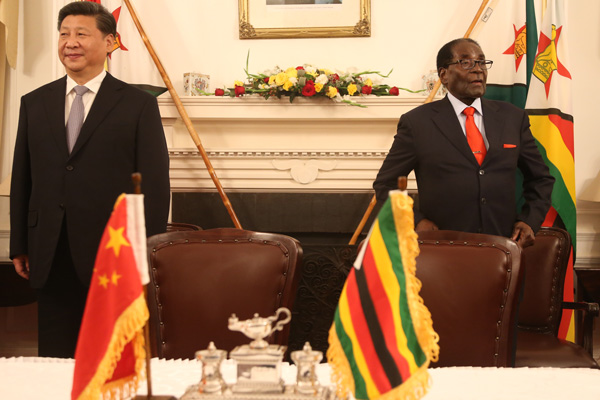
The hype that surrounded Chinese President Xi Jinping’s visit last week could have left many with a false hope that his mere presence would extinguish Zimbabwe’s economic problems overnight.
Standard Comment
There was so much excitement about the so-called mega deals estimated by some at the time to be above $4 billion.

For President Robert Mugabe, it was an opportunity to make those who maligned his government for its Look East policy eat humble pie.
However, a statement by the Finance ministry on Friday gave a more sober appraisal of the visit and it was devoid of the gleeful reporting by State media throughout the week.
The statement gave details of just three deals, which were a $1 billion loan to refurbish the Hwange Power Station, a grant to help construct a new Parliament building and a loan of $98 million to TelOne.
Perhaps the only freebies that Xi’s visit bore for some were the free copies of the China Daily newspaper that was distributed during the two days the Chinese leader was in Zimbabwe.
- Chamisa under fire over US$120K donation
- Mavhunga puts DeMbare into Chibuku quarterfinals
- Pension funds bet on Cabora Bassa oilfields
- Councils defy govt fire tender directive
Keep Reading
In contrast, a day after Xi left Zimbabwe, he was signing 26 bilateral deals worth $6,5 billion with his South African counterpart Jacob Zuma.
The deals were mainly to do with the building of infrastructure in Africa’s most industrialised country.
China also announced $60 billion in investment and development aid for Africa, an amount unprecedented in history.
The announcement was made on the sidelines of the China-Africa forum held in Johannesburg on Friday.
Mugabe was effusive in his praise of Xi, describing him as a “Godsend person”, but the reality is that investment from China will not just start flowing into Zimbabwe because we rolled out the red carpet for its leader.
Currently, Zimbabwe does not rank among top destinations for Chinese investment in Africa despite the abundance of natural resources that the Asian giant has an appetite for.
The reasons for this discrepancy are not rocket science.
China is not in the habit of throwing around its cash without guarantees for a return on its investments. This could be the reason the so-called mega deals that Mugabe signed during his visit to Beijing last year still remain on paper.
The reasons Western investors have for giving Zimbabwe a wide berth in the last decade or so are the same China has for not speeding up the implementation of the deals.
From the free copies of the China Daily newspaper, it was easy to discern that the Asian country is serious about fighting corruption.
The paper carries numerous stories of ruling Communist Party and government officials being punished for dabbling in corruption and drug abuse.
On the other hand, Zimbabwe only goes for the less influential people accused of corruption and those perceived to be after Mugabe’s crown, as was the case with former Vice-President Joice Mujuru.
A year after Mujuru and her allies were fired from government for alleged corruption; none of them has been taken to court to answer to these allegations.
The world knows that the real kingpins of corruption have protection from Mugabe’s regime because they are important in the Zanu PF leader’s scheme of self-preservation.
China will continue to play its clever game of appearing as Zimbabwe’s imminent saviour, but will not take the plunge before the country puts its house in order.
Only clear investment policies, protection of property rights and a stable political environment will see proper Chinese investment coming Zimbabwe’s way.
Zimbabwe has to haul itself out of the economic quagmire it created and stop wishing for a Santa Claus to come its way.
Researchers have proven that China’s pledges for African aid tend to be overstated when compared to real commitments.
According to the Foreign Policy magazine, China’s total financial commitments to Africa in recent years have been roughly $10 billion.
The publication noted that even this level of commitment had been difficult to finance in countries worried about rising debt.
Last year, Ghana had to cancel half of a $3 billion loan signed three years earlier with the China Development Bank because of such concerns, the magazine said.
Zimbabwe is already $10 billion in debt and this should be food for thought.











